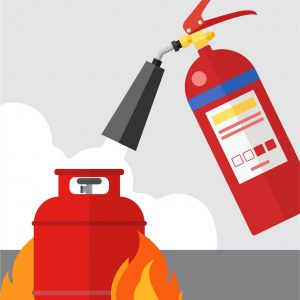How to Detect and Extinguish a Class C Fire (Flammable Gases)

What is a Class C fire?
Class C fires are identified by the presence of a burning gas. The most common flammable gases involved in fires are propane, butane and methane, and they form the ‘fuel’ aspect of the fire triangle, which is required for the fire to start, spread and continue to burn.
Flammable gases, whether kept in cylinders or bulk storage areas, pose a significant fire risk when not stored correctly and, similarly to Class B fires, are rarely used as a controlled method of fire. Instead, they are usually involved in accidental or arson-related highly dangerous fires. Additionally, as flammable gases are often heavier than air, they can travel a significant distance to an ignition source, which means fire can rapidly propagate and spread. This can often cause explosions, as the gases can erupt violently, causing severe and immediate impact.
Class C fires occur most commonly in environments which store and use large quantities of flammable gases, such as chemical plants and industrial warehouses. However, as they are also used in heating systems, they are also a risk in a host of other properties, including hospitals, schools and homes.
How do you extinguish a Class C fire?
Powder fire extinguishers are also known as multi-purpose extinguishers as they can be used on flammable solids (paper, wood, fabric etc.), flammable liquids (petrol, diesel, paint etc.), and, as discussed here, flammable gases. The powder within the extinguisher will act as a suppressing agent, smothering the oxygen within the fire and stopping embers from the fire from scattering and spreading.
How do you avoid Class C fires?
Class C fires are often one of the most difficult types of fire to actually extinguish – it is quite rare for a fire extinguisher to extinguish all the flames of a gas fire – making it incredibly important to try and avoid a Class C fire as far as possible.
If you own or manage a commercial environment, you have a legal duty to protect the people who live or work within it from the threat of fire, and this involves removing and reducing the risks and hazards associated with Class C fires. Therefore, all flammable gases must be stored safely, securely and as far away from ignition sources as possible.
You should also make sure that your environment conforms with each aspect of the Regulatory Reform (Fire Safety) Order 2005, which includes conducting and regularly updating a fire risk assessment, removing all the fire risks within your specific environment and installing and maintaining fire safety equipment, including fire alarms and fire extinguishers.
Not only will conducting all of this ensure that you comply with all your legal obligations, it will also protect the people within your building – and the structure itself – from the devastating effects that a Class C fire can cause.
Request a Callback
Just fill in your details below and we'll get back to you as soon as we can!

About Scutum London
Scutum London is a leading expert in fire safety and security solutions for businesses and organisations located across South East England, including London and Surrey.
From fire alarms, fire extinguishers and fire risk assessments to access control, CCTV and intruder alarm systems – and a lot more besides – we offer a comprehensive range of products and services designed to keep you, your business and your staff and visitors safe.
With decades of industry experience to call on, we’re proud to hold accreditations from leading trade associations and bodies such as British Approvals for Fire Equipment (BAFE), the British Fire Consortium, the Fire Industry Association (FIA) and Security Systems and Alarms Inspection Board (SSAIB).
If you’d like to find out more about Scutum London, get in touch with our friendly team or explore our products and services on our site.

